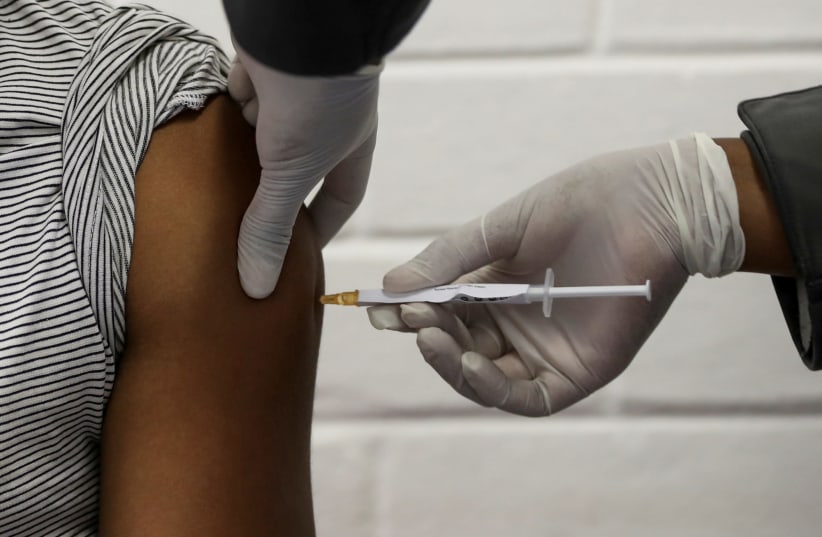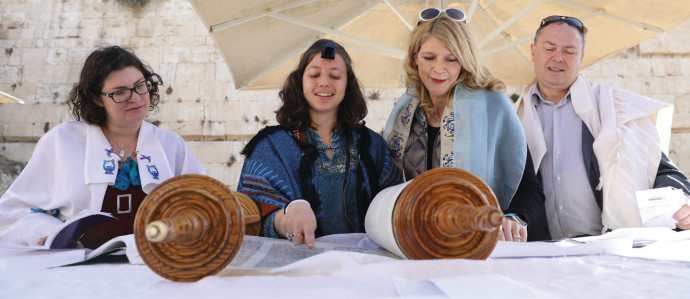A nonprofit supporting Christian missionary hospitals in Africa announced it received an $18 million donation last month, its biggest gift ever — and that the money is coming from an observant Jewish couple.
Rabbi Erica Gerson and her husband, Mark, a businessman, who helped found the African Mission Healthcare Foundation in 2010 and sit on its board, have now become possibly the largest private funders of Christian-provided medical care on the continent.
They say they don’t feel any contradiction or unease about donating to missionary institutions because the hospitals provide what is often the best or even the only medical care available in some parts of Africa. As many as 50% of health care providers on the continent are “faith-based,” according to estimates.
“We feel animated by the Talmudic teaching that saving a single life is saving a world,” said Erica, who was ordained as a rabbi at Hebrew Union College-Jewish Institute of Religion and is a trustee of Rodeph Sholom School, a Jewish day school in New York.
Mark added: “My wife’s a rabbi, and I’m the rabbi’s husband. And so we study the Torah and do what we can to live by the Torah, which more than anything else it tells us to love the stranger.”
The Gersons also send a lot of money to Israel, especially in support of United Hatzalah, a network of 6,000 volunteer medics who zip through traffic on motorcycles responding to emergencies before an ambulance can arrive.
The prevalence of missionary hospitals in Africa is a legacy of the 19th century when European groups sought to convert local populations, but, today, proselytizing isn’t part of the care provided, according to David Toole, a Duke University professor of ethics, theology and global health, who is researching the role of mission hospitals in African health care systems.
In the countries Toole has studied, Catholic hospitals, for example, outperform the government ones. “And the people know that,” Toole said. “So if you really get sick and you need care, you don’t go to the government hospital.”
The Christian hospitals’ effectiveness is directly related to their missionary identity: “It has a lot to do with morale of the employees, the way the employees are treated and the sense of mission that the hospital has as a Christian institution serving to the community,” Toole said. “They’re not proselytizing in any overt way. But they are trying to live out by example, what it means to be Christian. And the community sort of responds to that.”
Support for Christian hospitals in Africa has been dropping in recent decades as American and European mainline denominations that have traditionally sponsored the hospitals have shrunk in membership and influence.
Mark was first inspired to help make up for the difference by his college friend, Dr. Jon Fielder, who was working in a missionary hospital in Kenya in 2002 and described the life-saving work being done by doctors with very few resources.
Eventually, Mark made enough money through his company, the Gerson Lehrman Group, which offers expert advice to investors, to become a major benefactor of Fielder’s work.
Together they established African Mission Healthcare and launched the $500,000 L’Chaim prize for missionary doctors. (It took a while, but Mark’s Christian friends have now learned that the name of the prize isn’t pronounced “El Chime.”)
The Gersons’ latest gift isn’t just a step up in scale, it also represents a sort of graduation into a higher league of philanthropy due to the involvement of the United Bank of Switzerland, or UBS. The bank committed $2 million, giving the foundation not just money but an important seal of approval.
These donations will pay for surgeries, infrastructure such as electricity and oxygen, advanced medical training for locals, and a network of support for maternal health across 15 hospitals.
In the short gaps between the recent High Holidays, the Jewish Telegraphic Agency caught up with the Gersons in separate interviews about the anticipated impact of their giving, their decision as Jews to fund missionary medical work, their love of evangelical Christians and how the couple responds to those who suppose they are Messianic Jews.
The following Q&A combines both interviews and has been edited for brevity and clarity.
JTA: There’s the official story of your longstanding friendship with Dr. Fielder but can you tell more about how a Jewish couple comes to lead a foundation supporting missionary doctors in Africa?
Mark: The Torah tells us 36 times to love the stranger. So how can we best fulfill our responsibility to do so? When anyone does the math and tries to assess the return on investment from philanthropic gifts one will be drawn to the work of Christian missionary doctors working in Africa.
Erica: It’s not that we wouldn’t fund Jewish missionaries, but there are no Jewish missionaries. There happens not to be a network of Jewish hospitals to fund. We were looking to fund whoever can save lives in the most effective way.
Maimonides teaches that the highest form of tzedakah is helping a person to become self-sufficient. By strengthening healthcare systems in Africa and training the local population to become skilled medical professionals, we are helping communities move toward self-sufficiency in the area of medical care.
JTA: You don’t seem to have any discomfort around being part of a Christian missionary charity?
Mark: Not at all. We’ve been very close to missionary doctors since we got married 14 years ago. We always want to have them at our home so that our kids see firsthand what a person who is truly committed to his or her faith can accomplish and on behalf of others. They’ve taught us how to become better Jews.
JTA: Aside from your closeness with the missionary doctors, you also often appear on Christian Broadcast Network. Have you ever encountered skepticism from Christians about your involvement?
Mark: Not at all. The opposite. There’s a profound love right now between evangelical Christians and Jews. And so we’re honored to be a part of this burgeoning friendship. We as Jews and Christians learn from each other and admire each other, work together.
JTA: When it comes to these doctors and hospitals in Africa, what does “missionary” mean?
Erica: For a lot of Christians, it means living in the way that Jesus wanted them to live. They go through hardships of providing care with almost no resources knowing they are following in the footsteps of Jesus. And I understand why people might scratch their heads but it’s a little less weird when you think of, say, Mount Sinai Hospital in New York or other hospitals with religious connections. People of faith have always felt compelled to heal people. It’s not so surprising.
JTA: So say I’m sick and I want to get care. Do I have to listen to a lecture about Jesus or something like that?
Mark: No, great question. I used to wonder about that myself. I remember I asked a couple of missionaries who were over for dinner about that and they laughed. And then I went to Africa, I was talking to one church doctor, and I felt bad talking to him, because they have literally 10 hours of patients waiting to see him at any given point. It’s impractical to do anything else.
What happens, and not very often, is someone might say to doctors, “What inspires you to be here, you could be anywhere?” That opens a conversation. They would say this is what God and/or Jesus want me to do.
Erica: They serve everyone. There are never faith-based requirements or tests or proselytizing moments. But sometimes patients would find it strange if you didn’t pray with them. It’s common for doctors to pray with patients. It’s not an evangelizing moment.
JTA: Before we talked, I mentioned to my colleague that I’m interviewing this couple who are Jewish and are funding Christian missionary doctors in Africa. The first thing my colleague said, was “Oh, are they Messianic [meaning people who worship Jesus and identify as Jews]?” I’ll relay that question to you.
Mark: I am so glad you asked. No, absolutely not. This is what I always say: In the Bible, there’s the word “kadosh” and it means both separate and holy. You guys should be great Christians. We should be as good as Jews we can be. We should be best friends, but we shouldn’t mix the two.
We don’t know any Messianic Jews. There are no Messianic Jews in our organization. We have nothing to do with them.
When I go on Christian TV, which I love to do as often as I can, they ask my religion and I always say, “I’m a traditional observant Jew.” Now, Orthodox Jews would look at me and say, “yeah, right.”
JTA: Because you are Reform Jews?
Mark: I define myself as anti-denominational. There are enough things to separate us as Jews. The last thing we need is to say, “You’re Reform, you’re Orthodox, you’re Conservative.” But yes, my wife’s a Reform rabbi and our kids go to Reform day school and all that. But when I am on Christian TV, I’m observant. Am I really? I don’t know what that means. I study Torah every day. I do Shabbat dinner. Do I care there’s an eruv on the street? No.

